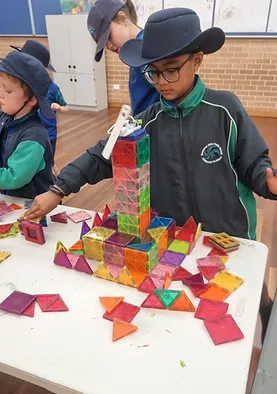Steam Junior Master Builders
Our primary school incursions are tailored and designed for K to Year 6 students.
The STEAM workshop offers a hands-on approach to get your students engaged in the learning process in a very unique way. STEAM education teaches maths, geometry, expression, art, problem-solving and much more in a play-based environment.
Our STEAM workshops operate on the underlying principles of equal opportunity and are based on participation, respecting and celebrating children's differences, and encouraging both boys and girls to explore the wonders of play-based STEAM education.
The purpose of these sessions is to stimulate the imagination and support the development of children's creativity, increase their ability to visualise concepts and engage in problem solving activities in teams. The desire to modify the environment arises from the observation.
The games we play enhance the learning of participants and allow them to develop their individual talents and explore new areas of interest. Our STEAM workshops also encourage an interest in the architectural aspects of our environment and contribute to psychomotor education of our youngest participants.
About the Program
Our primary school incursions are tailored and designed for K to Year 6 students.
The STEAM workshop offers a hands-on approach to get your students engaged in the learning process in a very unique way. STEAM education teaches maths, geometry, expression, art, problem-solving and much more in a play-based environment.
Our STEAM workshops operate on the underlying principles of equal opportunity and are based on participation, respecting and celebrating children's differences, and encouraging both boys and girls to explore the wonders of play-based STEAM education.
The purpose of these sessions is to stimulate the imagination and support the development of children's creativity, increase their ability to visualise concepts and engage in problem solving activities in teams. The desire to modify the environment arises from the observation.
The games we play enhance the learning of participants and allow them to develop their individual talents and explore new areas of interest. Our STEAM workshops also encourage an interest in the architectural aspects of our environment and contribute to psychomotor education of our youngest participants.
Questions & Answers
Objectives
Early Stage 1
Number and Algebra
ACMNA001
Establish understanding of the language and processes of counting by naming numbers in sequences
Early Stage 1
Number and Algebra
ACMNA005
Sort and classify familiar objects and explain the basis for these classifications. Copy, continue and create patterns with objects and drawings
Early Stage 1
Measurement and Geometry
ACMMG006
Use direct and indirect comparisons to decide which is longer, heavier or holds more, and explain reasoning in everyday language
Early Stage 1
Measurement and Geometry
ACMMG009
Sort, describe and name familiar two-dimensional shapes and three-dimensional objects in the environment
Early Stage 1
Statistics and Probability
ACMSP011
Answer yes/no questions to collect information and make simple inferences
Stage 1
Number and Algebra
ACMNA018
Investigate and describe number patterns formed by skip-counting and patterns with objects.
Stage 1
Measurement and Geometry
ACMMG019
Measure and compare the lengths and capacities of pairs of objects using uniform informal units
Stage 1
Measurement and Geometry
ACMMG022
Recognise and classify familiar two-dimensional shapes and three-dimensional objects using obvious features
Stage 1
Measurement and Geometry
ACMMG037
Compare and order several shapes and objects based on length, area, volume and capacity using appropriate uniform informal units.
Stage 1
Measurement and Geometry
ACMMG042
Describe and draw two-dimensional shapes, with and without digital technologies
Stage 1
Measurement and Geometry
ACMMG044
Interpret simple maps of familiar locations and identify the relative positions of key features
Stage 1
Statistics and Probability
ACMSP047
Identify practical activities and everyday events that involve chance. Describe outcomes as ‘likely’ or ‘unlikely’ and identify some events as ‘certain’ or ‘impossible’
Stage 2
Number and Algebra
ACMNA057
Represent and solve problems involving multiplication using efficient mental and written strategies and appropriate digital technologies
Stage 2
Number and Algebra
ACMNA291
Use efficient mental and written strategies and apply appropriate digital technologies to solve problems
